- Home
- Karen Traviss
The Best of Us Page 3
The Best of Us Read online
Page 3
“Wasn’t it a couple of hundred people? That’s a lot of names.”
“I don’t know. But I remember they all had to be single with no family to leave behind because it was going to take so long. That seemed so sad. All the more reason to commemorate them properly.”
Doug studied the plaque. He wondered what kind of men and women would be willing to leave behind everything they knew and loved, and risk the unknown for a mission that meant they’d probably never see home again even if it succeeded.
Had they wanted to, though? Maybe, like Chris and his band of vets, they’d just thought it was their duty. He’d never served. He’d never know.
“Yes,” he said, shaking his head. No families and no grave: anonymous and forgotten. You couldn’t get more dead than that. “Dreadful.”
* * *
Transit Camp, Near Kill Line:
2 hours later
Dr Morris arrived suited up and put on her mask as soon as she got out of her truck, then stopped and did a discreet double take, first at Chris’s rifle and then at the road through the camp.
Chris couldn’t remember the last time she’d visited. Maybe she was expecting to find mud huts and signs of recent cannibalism. It could have been the rifle, of course. Everyone here who could use a personal weapon carried one at all times, but few of the townsfolk seemed to. Morris looked down the rows of uniform cabins and straight dirt roads between them, edges marked with stones and carefully cut pole rails, nodding to herself.
“Very orderly,” she said. “You’ve done a lot of construction.”
“Yeah, we’ve got all the skills in-camp. Plumbing, carpentry, logistics, the works.”
“Have you got quarantine plans if your guy tests positive?”
“Yeah. We’ve always got a plan.”
“You certainly seem to.”
Chris almost recited the numbers to her, but it felt like he was justifying himself. One hundred and four people lived here, fifty-two of them military in one way or another, if not State Defence Force or retired then active-duty men and women from other services with no units left to return to. That was a lot of skills, but also a shared culture that just snapped together like a well-made machine. They’d been trained to deal with the worst that life could throw at them, and Chris had watched them do exactly that, even the ones he’d doubted. Everyone who’d joined them had survived, civilian and service personnel alike.
I promised I’d get them to safety, and I did. Am I forgiven yet? How do you know when you’ve atoned for the shit you’ve done? Do you suddenly just feel better about yourself, or do you hear some kind of klaxon that tells you your time’s done?
The end of the world had its advantages. The connected, recorded, filed, archived world had been broken apart, and nobody could run checks on anyone and decide they were undesirables. Morris probably wouldn’t have picked him for a neighbour if she’d known him better.
“Let’s do Mr... ” She studied something on her screen. “Zakkarija Chetcuti, yes? If he tests positive, I’ll make a start on the rest of the camp right away.”
Zakko was still sitting in his cabin, looking sheepish. He was in his late twenties, a stocky, harmless-looking guy with a mass of curly black hair. When Chris’s platoon found him in Baltimore, he’d been trying to hotwire an abandoned police cruiser. He hadn’t even tried to force open the weapons locker, which was the first thing most people did. He just wanted a ride out of the city. Even then, Chris suspected that Zakko didn’t really know how to be a bad guy. He wasn’t so much bad as a little short of impulse control. Maybe a few more chastening experiences like this would sort him out.
“You going to test me, ma’am?” Zakko asked.
“Yes, I need you to run your finger over this,” Morris said. The test kit was just a white printed plastic card, the touch test variety. “Press on each square for at least two seconds.”
“It looks like a shopping list of the world’s top twenty killer diseases,” Zakko said, fidgeting.
“It is. Better hope they’re sold out. Two seconds, okay?”
Chris watched as Zakko readied his finger, a forefinger he was damn lucky he still had, and dragged it down the first row of squares too fast.
“No, slowly,” Morris said. “Two seconds per square. There’s a different sensor or reagent in each one.”
“Yes, ma’am.”
Morris studied the results. Eventually she peeled off her mask one-handed and held up the card so Chris could see two rows of solid green squares. When she flexed it between her fingers to reset and sterilise it, it gave off a burst of light.
“I’ll take that as an all-clear,” Chris said.
Morris gave Zakko a practised professional smile. “You’re fine, Mr Chetcuti.”
Zakko beamed. “Thanks, ma’am.”
Morris turned to Chris. “So do you want me to set up a radiation test session for your people? You haven’t had one since you first got here. You could come into town, or I can do it here. Or I could give you a testing kit to do it yourselves if you prefer. Whatever’s easiest for you. You’ve got some trained personnel, haven’t you?”
“Two combat medics and a retired corpsman,” Chris said. “The test kit will be appreciated, ma’am. We don’t want to put you to any more trouble.”
Chris wasn’t even sure he meant that. He just didn’t want to be drawn further into a community that looked as if it had sat out the horrors of the last century in a rural theme park, oblivious. It wasn’t resentment. It was knowing that if his people moved in, sooner or later they’d all get to know each other well enough to talk frankly about how they came to be here, and then everyone would realise how big the gulf was between people who just fired warning shots and those who’d needed to become animals to stay alive.
Veneers had their place. As long as everyone knew they were just that, veneers, and that there was much plainer, uglier wood beneath that was best left unseen, then there was no deception. It was just an understanding that some necessary things weren’t meant to be on display.
Chris saw Morris off and started up the all-terrain quad bike that the farmers had donated. Seeing as Zakko was fully fit, he was going to be on latrine duty indefinitely until Chris decided he’d adjusted his attitude. In the meantime, they still had to find that girl. Chris couldn’t sleep until he knew for sure that she wasn’t scouting.
How did she get here?
Like everyone else who’d stumbled across Hart County, she’d have followed the river. But this Nanton place... he should have asked Doug if he’d heard of it. Never mind, he’d do that later. He had to get out there with the dogs and drones now.
As he rode through the camp at regulation slow speed, people came out of their cabins, bundled in coats. “Is it okay, then?” Jeanie Cleaver called. “Are we clear?”
“Yeah, nothing to worry about.” Chris waved back. “Just being careful.”
Howie jogged along beside him. “Yay! You fixed it, boss!” He was nine or ten, another kid with a dead family and bad memories, but he didn’t seem to realise what a shitty hand life had dealt him. He’d appointed himself the camp errand boy and morale officer for the older folk. Sometimes Chris felt less of a man than that boy was.
“I didn’t fix it,” Chris said. “I just did what we trained to do. Right?”
“Right!” Howie saluted. “Train hard, fight easy!”
Chris wondered who Howie had picked that up from. It wasn’t a bad lesson to learn, though. Howie eventually peeled off, probably to go cheer someone up, and Chris carried on to collect the dogs and the equipment from Dieter. He parked and walked up to the chain-link fence around the dog pen, watching the pack milling around.
Dieter had two dogs at his heels, Sapper and Girlie. Sapper was a German shepherd that Chris had often patrolled with, a trained dog they’d picked up at a police compound, but he was nervous
around Girlie. She was mostly husky. One vivid, staring blue eye and a bald scar on her nose made her look like an escaped psycho.
“You sure you want to do this on your own?” Dieter asked.
“Yeah. I can manage.”
“You’re absolutely sure you don’t want me to ride along?”
“I might need to do things you’d rather not see.”
“Okay.” Dieter held out a bag. “Drones and a receiver. Two-mile range, remember.”
Chris looked inside. There were a dozen walnut-sized drones with pop-out rotors, almost museum pieces but still up to recon tasks. He’d have to start replacing them soon. He didn’t want to rely on Doug’s offer, generous as it was, so they’d build their own or fall back on their fieldcraft skills.
“Got it,” Chris said, and started the bike.
The dogs jumped into the carrier on the back and settled down without prompting as if it was their daily commute, instantly zoned out on autopilot while they thought about happier things. Chris set off north-west for the river.
Dr Morris was right. It was a well-run camp. Chris was proud of the effort his people had put into building it. It was kind of Doug to let them hook up to the utilities, but they could survive without them and rely on their own methane digesters and wood stoves if they had to. They had a backup water supply from a stream, and they could clear land for crops if push came to shove. That was all they needed. As Chris rode past the snow-covered fields and watched the birds pecking around, he had to admit that there were worse places to be marooned.
We didn’t plan to stay, but maybe it’s time. Even if we reach the coast and find a ship heading south, what’s left now?
Driving always made him brood, and once he’d blocked out the things that would do him no good to rehash, other questions bubbled up to take their place. How many people were there in the Ainatio compound, and why did so few venture outside? And why were they so generous to the town, giving it whatever utilities, medicine, and little luxuries it wanted when they didn’t really need to support that many people? It didn’t take eleven hundred people to farm ten thousand acres. Kill Line was a lot of overhead, and it wasn’t like they could go work for anyone else. Ainatio was being the perfect neighbour. But Chris had never known a company to hand over a cent without a reason. Even in a collapsed economy where barter was all that was left, old commercial attitudes died hard.
No, he was the one still thinking like a debt collector. Ainatio now faced a world of shortages — shortages of food, people, and choices. They needed Kill Line a little more than Kill Line needed them. There were no other food suppliers out there, and no more labour to replace the townspeople if an epidemic broke out. That was all there was to it. He had to stop looking for things to doubt.
What a miracle, finding somewhere this clean, this perfect — well, way better than the city, anyway.
No, not a miracle. Just something that really needs explaining.
Girlie put her chin on Chris’s shoulder from behind and let out a disturbingly human, meat-scented sigh. “You need breath mints, lady,” he said, jerking his head away. Ainatio supplied those, too. “Nearly there.”
Her muscles stiffened against him as she pushed away and looked up, instantly silent and alert. When he glanced over his shoulder, Sapper was on his feet as well, ears pricked, looking and listening. They knew what they had to do.
Chris stopped the bike downstream of the bend in the river and tossed the drones into the air. They levelled off at ten feet, waiting for tasking. A few quick lines drawn on the handheld control screen with his finger set their general target position and path. Then they soared away, calculating their own optimum spacing. When Chris turned to the dogs, they were sniffing the ground like their noses were glued to it.
“Okay, guys, we’re going to cover the river, starting at the jetty, and work out in both directions.” Chris whispered it like he was briefing them. The dogs looked up into his face, all intense, unblinking concentration. “If we find her, you keep her there and wait. Got it?”
He could have sworn that they did. They almost looked like they were going to say “Roger that.”
He walked through the trees, Girlie to one side of him and Sapper to the other, until he reached the bank and looked to his right to see the remains of the jetty a hundred yards away. He crouched to listen. The dogs crouched too.
The video feeds tiled on his screen to give him a single collated aerial view tracking roughly north, taking in a mile-wide strip that showed both banks. He’d let the drones reach their transmission limit and then bring them back to repeat the process heading south, provided the dogs didn’t find something first.
“Okay,” he said. “Sapper, that way. North. Seek.” He gave the dog the same hand signal that he’d give a man, and Sapper shot off. Girlie waited for her orders, treading the ground on the spot like she was tap dancing. Combined with that mad blue eye, the effect was comical. Chris signalled south, downriver. “Seek, Girlie. Find her.”
He waited, watching the drone feeds. It was at least forty-eight hours since Zakko had seen the woman, and she could be long gone or dead from sepsis if her injury had been that bad, but all Chris needed to know was whether there was a gang in the area waiting to raid the camp. There probably weren’t many refugees on the move from the cities these days, but there would still be organised and violent gangs capable of following the trail here, just like the ones who’d tracked Chris from Baltimore. One more encounter would be one too many.
Yeah, we’ll be facing people like us. People used to fighting hard. We need to stockpile more ammo.
There was no such thing as enough. Crossbows were great, but real stopping power was better.
His calculations were interrupted by sudden, distant barking from the north. Sapper had found someone.
Chris ran at a crouch towards the sound, checking the screen and following the paw prints in the snow. Girlie rocketed past him in a flurry of cracking twigs and carried on like a missile in the direction of Sapper’s bark. Chris still couldn’t see anything via the drones, but the composite image showed a stand of pines ahead, and if he was going to hole up, that would have been where he’d have hidden. Most of the other trees were deciduous, bare branches at this time of year with little cover. He shoved the screen in his pocket and readied his rifle.
So... I tell her to go on her way, unless she’s a scout, in which case I shoot her. And what if she doesn’t go away and looks sick? I can’t invite her in.
Now he could hear both dogs barking, the steady arf-arf-arf they did when they were warning of strangers. When he reached them, they were staring into the pines, focused on something. Chris almost didn’t see what they were barking at, but then an artificially straight line caught his eye.
Someone had made a scrappy tent, a woodland camo tarp draped over a pole between two trunks. And there she was, an Asian girl, the sorriest looking kid he’d seen in a long time, huddled in a padded jacket and woolly hat as she knelt in the small opening of the makeshift shelter. She was nursing her arm. Damn, she looked like a corpse. No wonder Zakko had felt he had to help her. Either she was too weak to run or she’d decided not to try because the dogs would bring her down. Chris estimated she was mid to late teens, but she wouldn’t have been the first scout of that age he’d had to deal with.
He kept his rifle on her and walked slowly forward, stopping beyond her lunge range in case she decided to come at him. Whether she grabbed him to beg for help or claw his eyes out, it didn’t matter. Chris had seen too many epidemics to take the risk.
“Ma’am, this is a restricted area,” he said. “What are you doing here?”
“Whoa, whoa.” She lifted her arms in surrender. “Please — put the gun down. Call off the dogs.”
She didn’t sound like an American, or a kid. Chris had underestimated her age. “Where are your buddies?”
“I’m
on my own. You think I’d be in this state if I had backup?”
“Sorry, you need to move on. We can’t risk exposing folks here to infection.”
“I’m not contagious. I can prove it.”
“Yeah?”
“I’m going to reach in my pocket for a diag card. Okay? Just a card. I’ll show you.”
Chris assumed she meant a test card. Still kneeling, she moved her good arm back to feel for her pocket. He kept her in his sights, finger on the trigger. If the next thing he saw was a weapon, he’d drop her there and then. Sapper started growling.
“Sapper, no.” Chris wasn’t sure he could control the dogs if they decided to go for her. “Sapper, down.”
The girl took things very, very slowly. It was so damn cold that her hands must have been numb. A small blue plastic container emerged from her pocket, and yeah, it was a storage sleeve. She held it up.
“Okay, take the card out,” Chris said.
She fumbled for a while before gripping the exposed edge of the card between her teeth to drag it out, then pulled off one glove the same way. She pressed her finger repeatedly on the card before holding it up.
“I know you won’t want to get too close, so I’m going to move and put this where you can see it,” she said.
“Okay.” She knew the drill, then. She’d done this before. Chris watched the dogs, hoping they wouldn’t sense his doubt that he could control them. “Sapper, Girlie — stay. Down.”
“Girlie,” the woman snorted.
“It’s the dog’s name.”
“Oh.”
She edged forward on her knees and laid the card face up on the ground ten feet in front of him, then shuffled all the way back. The dogs watched, squared up and ready to pounce. Chris was half-listening for movement behind him in case he’d read it all wrong and this really was an ambush, but the dogs would hear it long before he did.
He took a cloth from his pocket to pick up the card and examine it without contaminating his gloves. They were his special Guard-issue ones, irreplaceable now. He didn’t want to have to burn them.

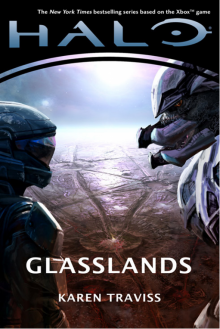 Halo: Glasslands
Halo: Glasslands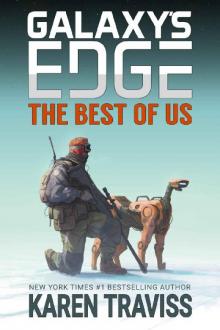 The Best of Us
The Best of Us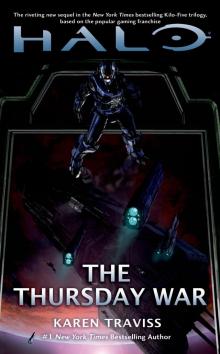 Halo: The Thursday War
Halo: The Thursday War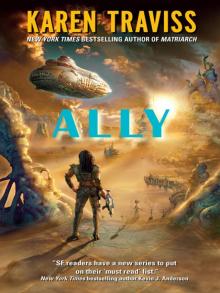 Ally
Ally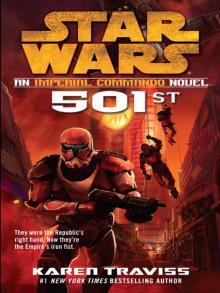 501st: An Imperial Commando Novel
501st: An Imperial Commando Novel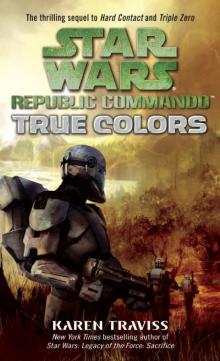 True Colors
True Colors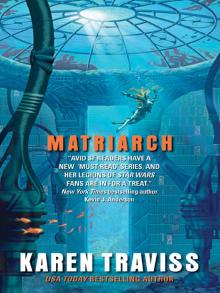 Matriarch
Matriarch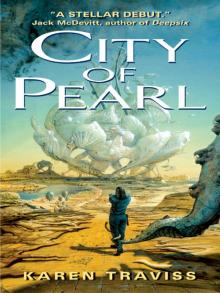 City of Pearl
City of Pearl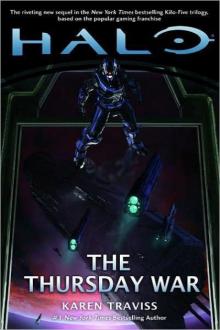 The Thursday War
The Thursday War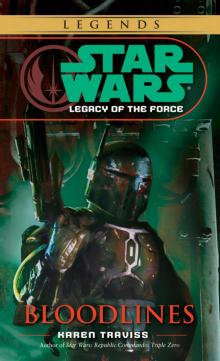 Bloodlines
Bloodlines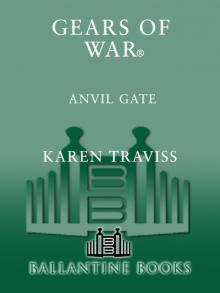 Gears of War: Anvil Gate
Gears of War: Anvil Gate Crossing the Line
Crossing the Line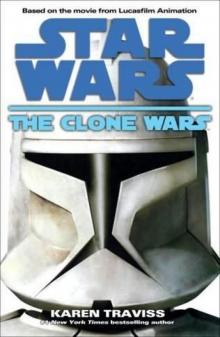 Star Wars - The Clone Wars 01
Star Wars - The Clone Wars 01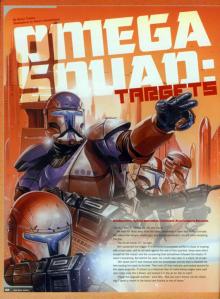 Omega Squad: Targets
Omega Squad: Targets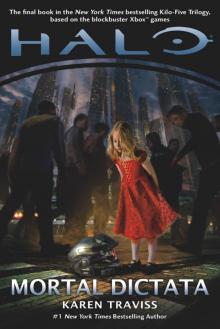 Halo®: Mortal Dictata
Halo®: Mortal Dictata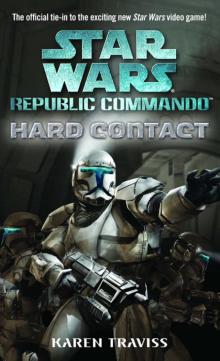 Hard Contact
Hard Contact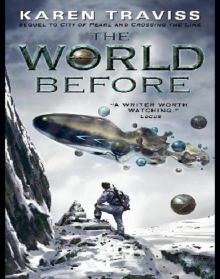 The World Before
The World Before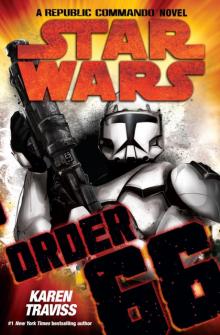 Order 66
Order 66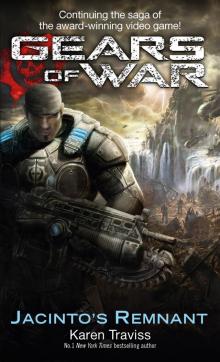 Gears of War: Jacinto's Remnant
Gears of War: Jacinto's Remnant Sacrifice
Sacrifice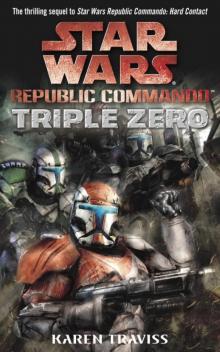 Triple Zero
Triple Zero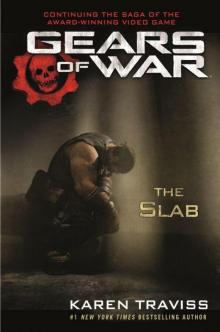 Gears of War: The Slab (Gears of War 5)
Gears of War: The Slab (Gears of War 5)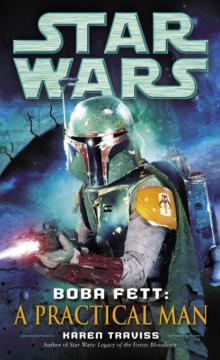 NEW JEDI ORDER: BOBA FETT: A PRACTICAL MAN
NEW JEDI ORDER: BOBA FETT: A PRACTICAL MAN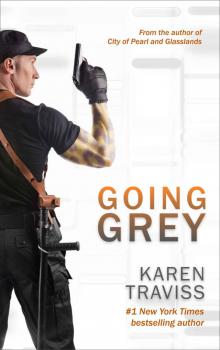 Going Grey
Going Grey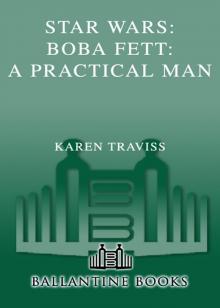 Star Wars: Boba Fett: A Practical Man
Star Wars: Boba Fett: A Practical Man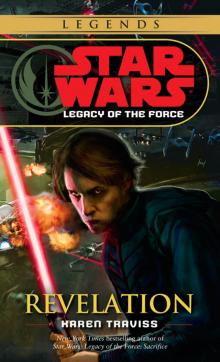 Revelation
Revelation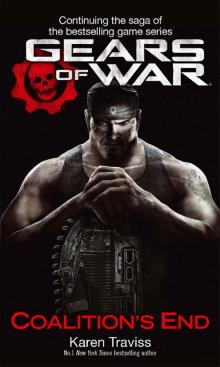 Coalition's End
Coalition's End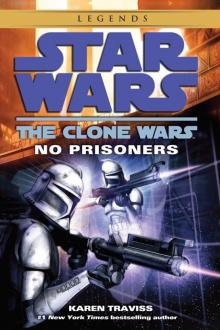 No Prisoners
No Prisoners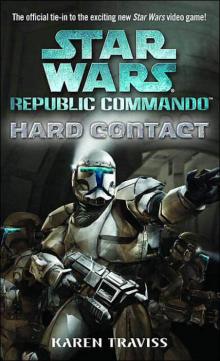 Star Wars Republic Commando: Hard Contact
Star Wars Republic Commando: Hard Contact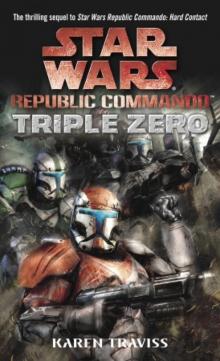 Star Wars: Republic Commando: Triple Zero rc-3
Star Wars: Republic Commando: Triple Zero rc-3 The Clone Wars
The Clone Wars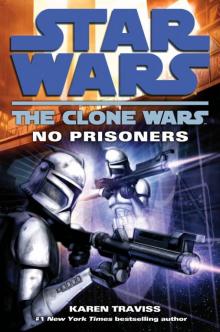 The Clone Wars: No Prisoners
The Clone Wars: No Prisoners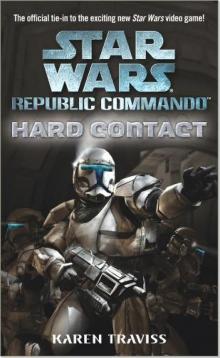 Star Wars: Republic Commando: Hard Contact rc-1
Star Wars: Republic Commando: Hard Contact rc-1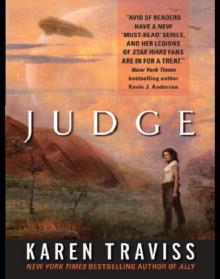 Judge
Judge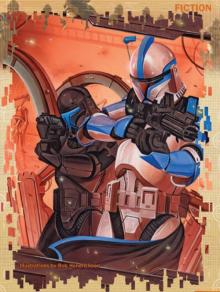 Omega Squad: Targets rc-4
Omega Squad: Targets rc-4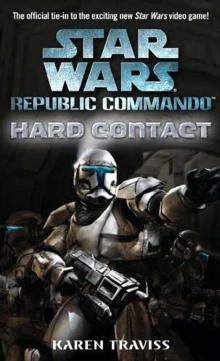 Star Wars - Republic Commando - Hard Contact
Star Wars - Republic Commando - Hard Contact